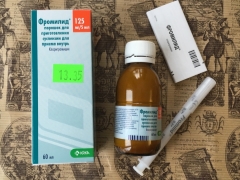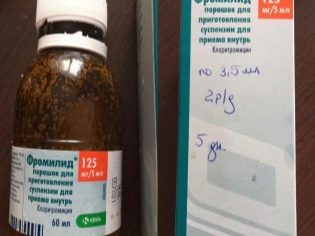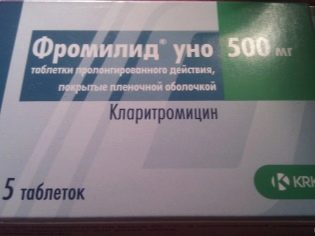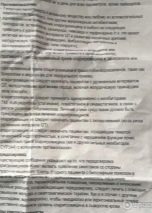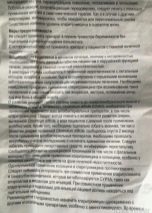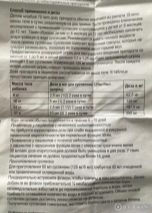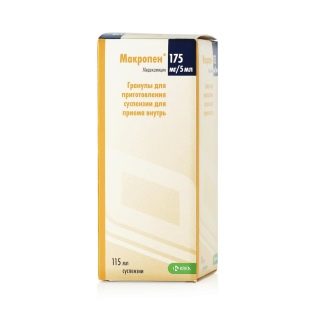Suspension "Fromilid" for children: instructions for use
Macrolide antibiotics are effective and safe, so they are often prescribed to children with various infectious diseases. These include the drug "Fromilid". To make the antibiotic easier to give to a small child, one of its dosage forms is a suspension. It is in demand for sinusitis, otitis media, bronchitis and other diseases caused by harmful bacteria.
Release form and composition
Fromilid for the preparation of suspensions is produced by KRKA from Slovenia in the form of granules placed in dark glass bottles of 100 ml. A plastic measuring syringe with marks from 1 to 5 ml is attached to the bottle. Inside one bottle is 25 grams of granules. They are small, light yellow or white in color and smell like banana. Their main ingredient is clarithromycin in the amount of 1.5 grams in one bottle.
When water is added to the inside of the vial, the granules dissolve and a homogeneous, yellowish-white suspension with a banana flavor and a sweet taste is obtained. She is discharged to children older than six months. 5 milliliters of such a liquid medication (in a single dosing syringe) contains 125 mg of clarithromycin. It is supplemented with sucrose, citric acid, povidone, banana flavoring and some other excipients.
In addition to the suspension, "Fromilid" is also available in solid form. It is an oval tablet in a yellow film shell, containing 250 mg or 500 mg of clarithromycin. In childhood, this "Fromilid" is used from 12 years. There are no other forms (capsules, injections, drops, etc.).
Operating principle
The drug has an antibacterial effect, due to the ability of clarithromycin to affect the ribosomes in the cells of pathogens, which leads to the suppression of protein synthesis. The drug affects the most common pathogens, including pneumococcus, haemophilus bacillus, Staphylococcus aureus and gonococcus. “Fromilid” is effective against chlamydia, mycobacteria, legionella and many other pathogens.
All sensitive microorganisms are listed in the paper manual, which is in the box with the bottle.
Indications
The reason for the appointment of "Fromilid" child is an infectious disease caused by one or more microorganisms that are sensitive to clarithromycin. For example, the suspension is discharged at:
- acute bronchitis;
- otitis media;
- tonsillopharyngitis;
- bacterial pneumonia;
- skin infections;
- infection with mycobacteria and other diseases.
Contraindications
"Fromilid" is not appointed when:
- hypersensitivity to any of the ingredients of the granules;
- allergies to any antibacterial drug from the group of macrolides;
- severe kidney disease;
- disturbances in the rhythm of the heartbeat;
- hypokalemia;
- severe liver failure.
Side effects
The digestive tract of some children reacts to the suspension with pain, diarrhea, taste distortion, nausea and other negative symptoms. Less commonly, the drug causes sleep disorders, dizziness, candidal stomatitis, a nervous condition, an allergic rash, changes in biochemical blood counts, and so on.
If such side effects occur, discontinue treatment and consult a specialist.
Instructions for use
To make a sweet syrup out of granules, 42 ml of water should be poured into the bottle. To do this, take purified or non-hot boiled water. It is best to pour the liquid into the bottle in several stages - first add only a part and mix well, and then pour water to the mark on the bottle.
To take medicine from the bottle you need a measuring syringe, which is placed in a box with a bottle. Since the ingredients of the suspension during storage settle to the bottom, the medicine is shaken before each use. When a child swallows the drug, it is advisable to offer him some water so that the medicine remaining in the mouth will be in the stomach. After giving the agent to the child, the syringe is washed with water and allowed to dry until the next use.
The daily dosage of "Fromilid" for a child is calculated by weight and is 15 mg of active compound per 1 kg of patient's body weight. Having calculated the required amount of suspension per day, it is divided into 2 doses with an interval of 12 hours. In addition, you can see the approximate dosage of the drug in the paper annotation attached to the bottle.
The child can take the suspension both before meals and at any other time, since the diet does not affect the treatment with this drug. The duration of use of "Fromilid" is usually from 5 to 10 days.
Overdose
If you accidentally exceed the dose of the drug, it can cause nausea, abdominal pain and other negative symptoms of the gastrointestinal tract. If an overdose is detected, gastric lavage and symptomatic therapy are recommended.
Interaction with other drugs
The use of "Fromilid" should not be combined with treatment by many other means, among which there are drugs of phenytoin, colchicine, theophylline, cyclosporine, terfenadine.
If the child is already taking any medication, then their compatibility with the suspension should be checked with the doctor or in the annotation.
Terms of sale and storage
To buy a suspension of "Fromilid" in a pharmacy, you need to get a prescription from your doctor. The expiration date of the medication, if the bottle is sealed, is 2 years. Keep it at home should be at a temperature of up to +30 degrees. After mixing with water, “Fromilid” can be stored at a temperature not higher than +25 degrees for a maximum of 14 days. Storage should be dark and hidden from children.
Reviews
In most cases, "Fromilid" speak well, noting its high efficiency in various bacterial infections. The drug in suspension is praised for its convenient form, fast therapeutic effect, good tolerance and pleasant taste. By cons means carry many contraindications and high price.
Analogs
If it is not possible to use "Fromilid", it is permissible to replace it with another medicine based on clarithromycin, for example, with a suspension "Klacid". Also, as macromide analogues, other macrolide antibiotics are often used - “Hemomycin», «Azitrox», «Macropene», «Sumamed», «Vilprafen"And other medicines. If a young patient is found to be allergic to such antimicrobial agents, the doctor will prescribe another antibiotic, for example, "OspamoxOr Augmentin.
In what cases the child should be given antibiotics, see below.
